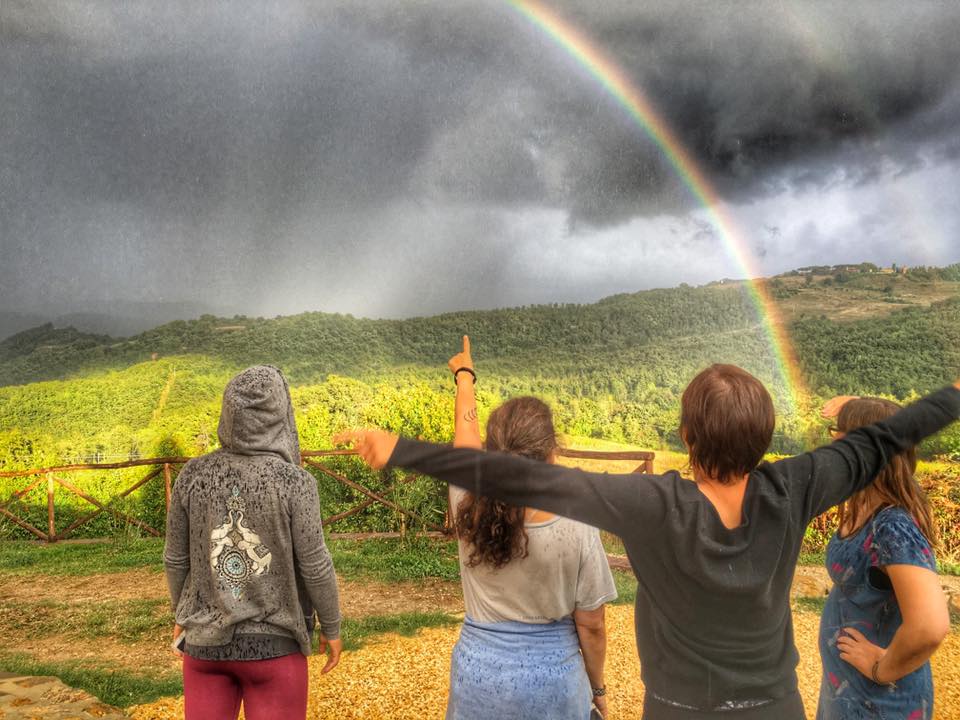By Kristin Wagner
When I say goodnight to Christopher, I curl up next to him in his tiny bed. We listen to the first half of the nursery rhyme CD we’ve played every night for the last six years. I stay cuddled with him until the end of “The Three Little Kittens”; I use my hand as a puppet version of the disappointed mother cat mouthing the words, “And you shall have no pie” then I use my hand to kiss his cheeks as I tell him I love him and sneak over to Nicholas’s bed.
I rub Nicholas’s back and talk with him about his day until “The Wheels on the Bus” finishes up. We have a ritual of conversation that is identical every night, and is repeated on days when he feels most anxious or sad. I ruffle his hair and say, “I love you. Sweet dreams and good night. I’ll see you in the morning,” which he then repeats verbatim, “I love you. Sweet dreams and good night. He asks me, “Are you staying up?” “Yep.” I then wander back over to Christopher for one last hug before I turn on the seven minute CD. As a final reassurance Christopher often throws an arm around my neck tightly then releases me with a sweet but sassy, “You can go now.” Sometimes he has already fallen asleep and I sneak a kiss on his forehead then tiptoe away.
One night, when Nicholas was nine and Christopher was seven, I went to give Christopher his last hug. He perched a little stuffed owl named Syrup on my nose and said in Syrup’s high voice, “Hi, how are you today?”
That moment fell over me in a sort of crushing happiness that felt a little unfamiliar and scary.
Nothing about this moment was remarkable or unique except I had suddenly realized that the girl I was would be so happy to know that she and I got to experience this. My older son snuggled into his bedding feeling safe and secure, my younger son taking a moment to be goofy with me, this was something she always dreamed she would have. She wanted children so very much. She wanted children to tuck in and read stories to, children who make jokes and dance in hallways after baths and boop you on the nose with their stuffed animals. I had made her dreams come true almost by accident.
I had wanted four children, when I sporadically admitted to myself that having children was something I very much wanted. I am the oldest of four, and my younger brothers are some of my favorite people on earth. Four for me was the ideal number of children to bring a lot of amazing people into the world without being dragged down to the bottom of a pit of overwhelm.
I never expected that having only two children would have been too much.
My husband Greg and I had two boys in the span of two and a half years, two surgeries where my innards lay on a table before being carefully tucked back inside, two rounds of colicky children, one husband who needed to travel internationally almost each week, one recession and an unnamed disease that filled the cracks of my life with pain and confusion.
I had, unknowingly, developed fibromyalgia, a pain and fatigue disease that has no clear origin and no clear cure. On my worst days it felt as if a swarm of bees had come after me, stinging me on my shoulders, my back, my scalp, every inch of my skin. My muscles would twist on themselves so tightly that one of the boys jumping into my lap unexpectedly would cause my eyes to blur in tears as I tried to compose myself. I didn’t want them to know they had hurt me so badly just by being themselves.
When Nicholas was three I remember yelling at him one bedtime, trying to explain to him that I would not, I could not stay another moment in his room. That my skin was on fire, that my brain was screaming, that I was going to throw up, that I could not pantomime “The Wheels on the Bus” again and again. Repetition always soothed him, but enraged me as I needed to escape his needs for just a moment. I couldn’t spend time any longer keeping him from crying as I couldn’t keep myself from crying. I ran from the room, sobbing on the couch yelling, “I can’t do this anymore.”
Greg somehow convinced Nicholas to listen to the music just one time without me, to let himself fall asleep without another round. By the time he had performed this miracle and wandered back downstairs, he found me sweaty, puffy and subdued. Meekly guilty I asked, “Is he okay?”
Greg nodded, “I spied on him for a minute without him noticing. He was moving his hands back and forth to the ‘doors on the bus swing open and shut part’ by himself.” His eyes softened a bit.
I asked the question I didn’t want to know the answer to. “Is he lonely?”
Greg nodded even more softly, “A little.”
That sadness, making a three-year-old console himself because I was too broken to do so, to have to explain that he needed to be independent from Mommy because Mommy needs our help, haunted me for years. The image of him waving his hands to himself, of finishing the music in the dark with a heart-broken sigh undid me. The illusion that I could make the world perfect had shattered for both of us, and the reality that both he and I had needs that would go unmet seemed a harsh truth to lay at a three-year-old’s feet.
I knew then that my dream of having four children was not achievable.
I had met my limit, the maximum that I could handle in this arena of life. I was a good person whose resources and intentions were siphoning away at an alarming rate. Eventually, I learned to do the most I could with the little I had left. I pared my expectations down to the bone. I reserved all the energy I had left after painful days to stretch my patience, to wrap it around my children as often as I could. I learned how to accept that teaching my two boys independence wasn’t a bad thing. That I was raising two children well, who would grow up with empathy for other struggling people because of, not in spite of me.
However, raising four children well became something I imagined I could have done in a parallel universe, a universe where I wasn’t sick. What if I didn’t have these diseases? What if I had just stayed healthy and whole, who knows what I could have done? This dreaming ignored the reality that raising four children might have been too much for me to handle even if I was healthy, that raising children, though it happens every day, everywhere is inherently difficult. That realization didn’t stop me from imagining the two younger siblings my kids should have had, if my body hadn’t failed us.
I mourned so long and so hard for the loss of my health, and for the loss of those two other children, the ones I would never meet, that it took me far too long to recognize the miracle of the two I already had. The miracle of feeling just well enough and whole enough, six years later, to absorb the extra moment of a stuffed owl bopping me on the nose and an extra repetition of “I love you, sweet dreams and goodnight.”
Kristen Wagner writes creative non-fiction and is a stay-at-home mother in the Chicagoland area. She has been published at Literary Mama, Quail Bell Magazine, Mother Always Write and Full Grown People. She has essay in The Rumpus forthcoming summer about my former life as a high school English teacher in Texas during the first hurricane evacuation after Katrina. She posts regularly about kids, illness, pop culture and food at kristindemarcowagner.com

Join The Manifestation Retreat: Manifesting Under The Tuscan Sun. June 17-24. Email retreats@jenniferpastiloff.com or click the picture above.

Join Jen Pastiloff at her signature workshop in Atlanta at Form Yoga on Aug 26 by clicking the picture.






No Comments